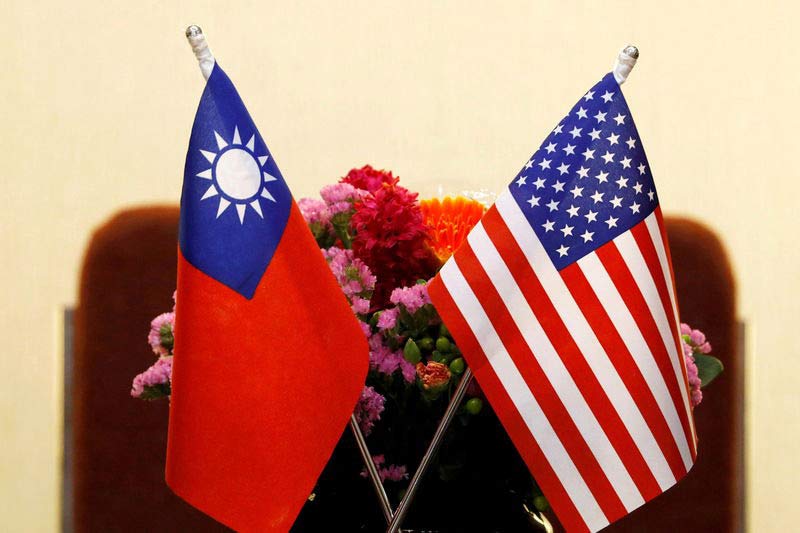
Flags of Taiwan and U.S. are placed for a meeting in Taipei on March 27, 2018.
November 18, 2021
WASHINGTON (Reuters) – Urgent measures are needed to strengthen the credibility of U.S. military deterrence of any potential Chinese aggression against Taiwan, according to a report from a bipartisan advisory body to the U.S. Congress published Wednesday.
The influential U.S.-China Economic and Security Review Commission (USCC) included a range of recommendations about Taiwan in its annual report to Congress, amid heightened tensions between the democratically ruled island and China.
The report said Congress should authorize and appropriate funds for Taiwan to purchase defense articles from the United States and finance the deployment of cruise and ballistic missiles and other munitions in the Indo-Pacific while increasing funding for surveillance.
“A lack of clarity in U.S. policy could contribute to a deterrence failure if Chinese leaders interpret that policy to mean opportunistic aggression against Taiwan might not provoke a quick or decisive U.S. response,” the report said.
China claims Taiwan as its own and has vowed to bring the island under Chinese control, by force if necessary, and tensions across the Taiwan Strait have escalated in recent months.
In a video call this week, Chinese leader Xi Jinping warned Biden that China would respond to provocations on Taiwan.
The report addressed a range of economic issues between the United States and China, including recommending Congress consider legislation to address risks to U.S. investors and interests in China investment.
China’s capital controls “may limit investors’ abilities to move money out of equity and bond investments and the lack of oversight by trusted authorities may jeopardize investors’ funds,” Commission chair Robin Cleveland said in an opening statement. “More importantly, numerous companies which will benefit from U.S. investment have been formally identified as threats to U.S. national security interests.”
The report recommends prohibiting or at least better identifying the risks of variable interest entities, where mainland Chinese companies create offshore corporate entities to circumvent China’s prohibitions on foreign direct investment in certain industries and list on U.S. exchanges.
The report said U.S. participation in China’s financial markets was increasing — reaching as much as $1.2 trillion in 2020 — and “outpacing the U.S. government’s defense” against threats posed by problematic Chinese companies.
The Biden administration has prohibited investment in 24 publicly traded Chinese companies but, Commissioners Jeffrey Feidler and Michael Wessel say, “many more should be on the list.”
Top Articles in News Services
-

Survey Shows False Election Info Perceived as True
-

Prudential Life Expected to Face Inspection over Fraud
-

Hong Kong Ex-Publisher Jimmy Lai’s Sentence Raises International Outcry as China Defends It
-

Japan’s Nikkei Stock Average Touches 58,000 as Yen, Jgbs Rally on Election Fallout (UPDATE 1)
-

Trump Names Former Federal Reserve Governor Warsh as the Next Fed Chair, Replacing Powell
JN ACCESS RANKING
-

Japan PM Takaichi’s Cabinet Resigns en Masse
-

Japan Institute to Use Domestic Commercial Optical Lattice Clock to Set Japan Standard Time
-

Israeli Ambassador to Japan Speaks about Japan’s Role in the Reconstruction of Gaza
-

Man Infected with Measles Reportedly Dined at Restaurant in Tokyo Station
-

Videos Plagiarized, Reposted with False Subtitles Claiming ‘Ryukyu Belongs to China’; Anti-China False Information Also Posted in Japan


























